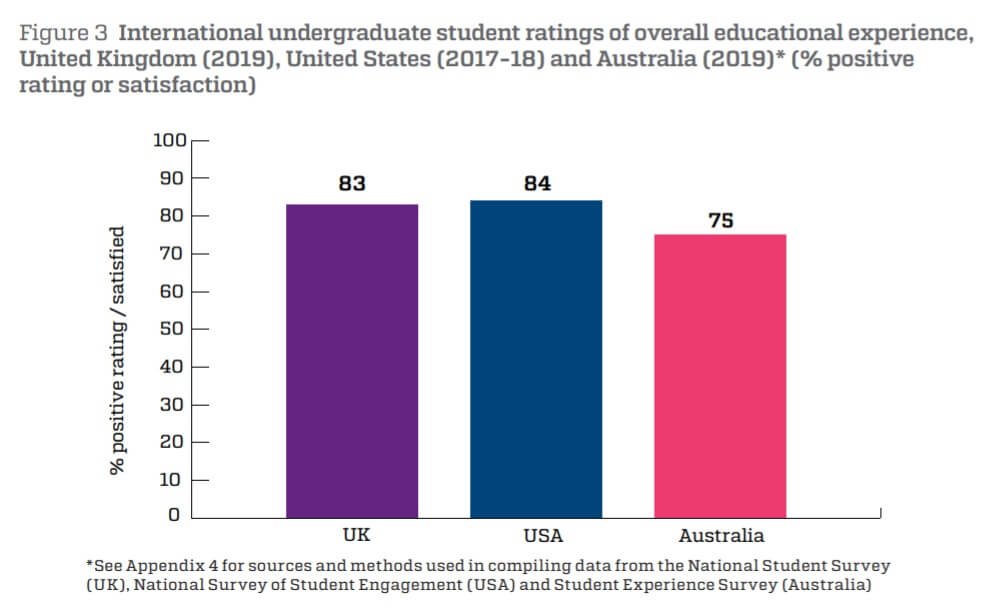
Among the most important reasons international students flock to the Land Down Under is to gain a reputable Australian education, but the overall quality of higher education experiences of international students at education providers in Australia fell in 2020, found a recent survey.
The 2020 International Student Experience Survey (SES) shows international students in Australia rated their overall educational experience at 75% in 2019, falling to 63% in 2020 with the impact of the pandemic. These results are lower than those recorded for international students in the US at 84% (2017 and 2018 combined, latest available data as shown by the National Survey of Student Engagement – NSSE) and the UK at 83% (2019, as shown by the National Student Survey – NSS).
In general, the SES also found that international students in Australia rated their study experience more highly than did international students who studied offshore. “Differences in the student experience between these two groups of students was most keenly felt in Learner Engagement, with international onshore students rating this aspect at 50% in comparison with 42% among international students who were studying offshore, a gap of eight percentage points,” said the report.
The SES measures five aspects of the student experience: Skills Development, Learner Engagement, Teaching Quality, Student Support, and Learning Resources.
International onshore students rated their experience higher in Skills Development, 76%; Teaching Quality, 75%; Student Support, 71%; and the quality of their entire educational experience, 64%, in comparison with international students who were studying offshore who rated these aspects of their experience at 73%, 73%, 67% and 61% respectively. Both international onshore and offshore students rated their Learning Resources equally at 72%.

The SES shows international students in Australia rated their overall Australian education experience at 75% in 2019, falling to 63% in 2020 with the impact of COVID-19. Source: SES
Chinese, Malaysian undergraduates report lower quality of education experiences
The survey also found that the overall quality of education experiences of international students at education providers in Australia fell in 2020, specifically among Chinese and Malaysian undergraduates. This is most likely a result of changes in teaching and learning arrangements in response to COVID-19.
In general, the largest changes in student ratings among international students were in Learner Engagement, Learning Resources and the quality of their entire educational experience and this was also the case among the top five student source countries: China, India, Nepal, Vietnam and Malaysia.
Student ratings of Learner Engagement declined most among Chinese students by 14 percentage points and Malaysian students by 13 percentage points. Student ratings of Learning Resources declined most among Chinese students by 16 percentage points and among Malaysian students by 11 percentage points. Student ratings of the quality of their entire educational experience declined most among Chinese students by 17 percentage points and among Malaysian students by 16 percentage points.

International undergraduate student education experience by country. Source: SES
Is an Australian education still coveted?
An Australian education is still broadly viewed as a reputable education among respondents. International students studying in Australia were asked to rate how important a variety of reasons were in their decision to study in Australia.
International undergraduates’ major reasons for choosing to study in Australia were a mix of educational and social reasons; 96% of respondents rated the following as extremely important or important:
- Reputation of the qualification
- Institution offered the course students wanted to study
- Personal safety and security
High levels of importance (94%) were attached to the reputation of an Australian education system, the reputation of the education provider and employment opportunities after completing the course, said the report. Also rated as important reasons for wanting to study in Australia by 90% of respondents were the course fee, the opportunity to study in an English-speaking country and the chance to experience a new culture/lifestyle.
A total of 87,491 offshore and onshore international students were surveyed between July and October 2020.










